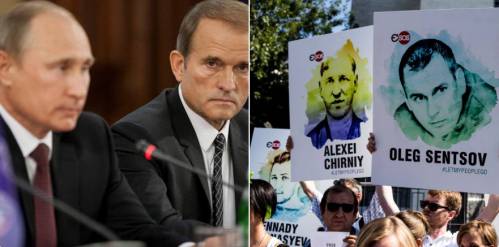Putin wants ’grounds’ to release innocent Ukrainian political prisoners

Grotesquely flawed trials and proof of total innocence are not enough for Russian President Vladimir Putin, it seems. He needs ‘grounds’ why he should release Ukrainian filmmaker Oleg Sentsov, civic activist Oleksandr Kolchenko and other Ukrainian political prisoners. Nor, according to the source close to Putin, are western demands of any influence, though that may be what he’s supposed to say.
Radio Svoboda has spoken with Viktor Medvedchuk, the controversial Ukrainian politician and close Putin associate involved in the Minsk negotiations, and in the recent release of Nadiya Savchenko, Yury Soloshenko and Gennady Afanasyev.
In the summer of 2014, there seemed strong grounds for believing that Putin was pushing for Medvedchuk to take over in Donbas and carry out the so-called ‘federalization’ that Russia was demanding and that Medvedchuk is on record as supporting. For that reason and others, he is distrusted by many Ukrainians, however his relations with Putin are believed to have helped secure the release of some of the Ukrainians held hostage in Donbas, as well as three of Russia’s Ukrainian political prisoners. Medvedchuk himself says that since he began negotiating on releases in December 2014, 402 people have been freed.
He was stated by Putin himself to have played a major role in the exchange on May 25, 2016 of Ukrainian ex-military pilot and MP Nadiya Savchenko for two Russian military intelligence officers captured during an attack on a Ukrainian post in the Luhansk oblast. He repeats the official Kremlin line that her release was to secure the release of the two Russians Yevgeny Yerofeyev and Aleksander Aleksandrov, and because of appeals for clemency from the relatives of the two journalists whose deaths she was claimed to have been involved in. Medvedchuk denies that other countries and international bodies had anything to do with it.
Both the EU and US welcomed the release as evidence of Russia’s willingness to implement the Minsk Agreement, although this seemed seriously optimistic given that the latter demands the exchange of prisoners on an all for all basis. In this case, a person who had been captured in Ukraine by Kremlin-backed militants, taken against her will to Russia and sentenced on absurd charges to over 20 years’ imprisonment had been exchanged for two Russian military men caught committing a hostile act in a country Russia is not formally at war with.
The exchange on June 14 of 74-year-old Yury Soloshenko and Gennady Afanasyev, one of the four Crimean opponents of Russian annexation arrested together with Sentsov, had raised hopes that Moscow might at least be ready to free those Ukrainian political prisoners held in Russia.
Since then, however, there has been silence. Medvedchuk spoke about the difficulties in agreement over exchange of prisoners, and noted that the Kremlin-backed militants of the so-called ‘Donetsk and Luhansk people’s republics’ are demanding that Ukraine first pass an amnesty law. This appears to be a delaying tactic and not required for the release of all hostages, unlike the pull-out of all heavy weapons which has still not happened.
Medvedchuk’s statements about Ukrainians held in Russia were of concern. He claimed, for example, that only Savchenko fell under the Minsk Agreement, since she alone had taken part in the military action in Donbas.
This very narrow interpretation is at variance with that taken by European bodies and the USA who have all repeatedly called for the release of Sentsov, Kolchenko and all other persons illegally held, in compliance with Minsk.
It may be for strategic reasons that Medvedchuk speaks as though he genuinely believes that the prisoners held in Russia actually committed the crimes of which they were convicted. All, including Savchenko, were found guilty by Russian courts, but it would be difficult to find anybody, not duped by pro-Kremlin media, who would take such convictions seriously.
Of greater concern is his suggestion that there is a problem because Sentsov, Kolchenko and Oleksy Chirniy were convicted of crimes allegedly committed in Crimea. Medvedchuk says that this is “de jure viewed by Russia as its territory”, though he does later acknowledge that de jure it is Ukrainian. It is de facto not under Ukraine’s control, and he claims that Russia has no obligation to release the other 9 prisoners whose release he is trying to secure.
In fact, this argument falters simply by virtue of the fact that Afanasyev, one of the four Crimeans arrested in May 2014 and convicted of a ‘terrorist plot’, has already been exchanged (for two Ukrainians accused of separatism with a strongly Russian trail). If Afanasyev was released because of a health condition, then why not Stanislav Klykh who is believed to be in a terrible condition? There is also suggestion that Chirniy has now been brought to Moscow in preparation for his release.
This leaves the two men - Sentsov and Kolchenko – who remained unbroken throughout and whose “ideologically motivated state terror” and “absolutely Stalinist trial” ending in 20- and 10-year sentences were seen and condemned by the entire democratic world.
It would certainly be difficult, after the clear travesties played out in Russian courts, for Moscow to suddenly accept proof of miscarriages of justice. That leaves, Medvedchuk asserts, the problem of ‘grounds’ for releasing the men, with the need for Putin to pardon innocent men supposedly needing to be ‘substantiated’.
Medvedchuk’s mandate does not cover prisoners now held in Russian-occupied Crimea. He mentions 9 prisoners whose cases are described below, together with addresses for writing to them. Please show them and Moscow that they are not forgotten!
Oleksandr Kolchenko, Oleg Sentsov and Oleksiy Chirniy





